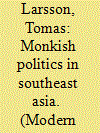|
|
|
Sort Order |
|
|
|
Items / Page
|
|
|
|
|
|
|
| Srl | Item |
| 1 |
ID:
139665


|
|
|
|
|
| Summary/Abstract |
In the Theravāda Buddhist polities on the mainland of Southeast Asia, abiding concerns about the proper structuring of the relationship between the ‘two wheels of dhamma’ (i.e. the realm of religion and the realm of politics) have had a profound influence on processes of state formation and political legitimation. This article explores one such religious ‘effect’ on the constitutions and electoral laws of modern Burma/Myanmar, Siam/Thailand, Cambodia, and Laos, namely the official disenfranchisement of Buddhist monks (and, in some instances, Buddhist ‘nuns’ as well as non-Buddhist clergy). The article traces the historical evolution of this Buddhist exception to the democratic principle of equal and universal suffrage, and assesses the extent to which dominant theoretical approaches in the social sciences help us to understand the politics of religious disenfranchisement in Southeast Asia. It finds that neither secularization theory nor the religious-economy approach can explain observed patterns. Instead, the article offers an account of the politics of religious disenfranchisement that emphasizes the role of ideas and historical context.
|
|
|
|
|
|
|
|
|
|
|
|
|
|
|
|
| 2 |
ID:
193607


|
|
|
|
|
| Summary/Abstract |
The political salience of religious issues and identities has been rising in Thailand, and this is increasingly reflected in electoral politics. Thai political parties seek to position themselves in relation to struggles over the location of the ideological centre of gravity, which has pitted defenders of the religio-political status quo—a monarchy-centred civil-religious nationalism—against Buddhist nationalists, on the one hand, and proponents of greater secularization, on the other. In the 2019 general election, political entrepreneurs ‘particized’ these religio-political differences, which has far-reaching implications for majority-minority relations, to an extent that appears unprecedented in recent Thai political history. This argument is developed through an analysis of the platforms, policies, and rhetoric put forward by political parties contesting the election, which concluded an almost five-year period of direct military rule. This analysis suggests we need to pay greater attention to the role of political parties and electoral competition in maintaining and contesting the secular settlement in Thailand.
|
|
|
|
|
|
|
|
|
|
|
|
|
|
|
|
| 3 |
ID:
082029


|
|
|
|
|
| Publication |
2008.
|
| Summary/Abstract |
Thailand and Japan both faced the threat of colonialism in the latter half of the nineteenth century. While geopolitical vulnerabilities provided Japan with a critical impetus for defensive modernization, they compelled the Siamese state to pursue a strategy of defensive underdevelopment. To understand this paradox, the article explores how variations in the "unequal treaties" imposed on Japan and Siam by Western powers shaped state interests in a policy area of vital importance to the two countries' predominantly agricultural economies: the rural land rights regime
|
|
|
|
|
|
|
|
|
|
|
|
|
|
|
|
|
|
|
|
|